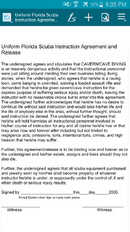In California, recreational activity releases can release the service provider for simple negligence, but not for gross negligence.
That's the law in every state in the Union. You can't disclaim gross negligence only simple negligence no matter how many legal-ese fancy forms you make your customers sign.
And I suspect if any lawyer has never lost a scuba case, he hasn't been involved in many scuba cases. No laywer I ever knew had a 100% scoreboard.

That's why a lawyer (with any integrity) won't guarantee the outcome of a case. He can't. It isn't his call. The judge or jury is the decider. The lawyer has absolutely no control over how a case is decided. If he "guaranteed" and outcome he'd end up in front of his State Bar Disciplinary Board. A guarantee is a warranty contract. A contract he can't possibly fulfill for the reasons I gave above.
"State of mind" plays no part in a contract, at least not in America. State of mind is an element of criminal cases. That's the purpose of a contract. So that the terms are clear and understood and not ambiguous.
And so far as "waiving your heirs rights", you can't do that either in America. Rights can only be waived by the interested party and no one else can waive your rights. I suspect what a lot of amateur waiver form writers intend in waiving the rights of the deceased persons ESTATE in their clause. Meaning when you die diving on Joe's dive boat, The executor of your estate can't sue Joe for his negligence, as the executor is acting on the decadents behalf and for the decadents benefit. Your wife and your daughter are sovereign concerning anything their husband/father signed before he got on. No one can waive their rights but them. Think about it....If someone else could waive your rights, wouldn't Ford or Chevrolet just waive your rights in a lawsuit when their manufacturing defect injured you in a wreck? Airbags???? Remember the airbags fiasco where the auto manufacturers used airbags that they KNEW or should have known were defective? Many people were killed or injured when these airbags failed to deploy in crashes. If releasing someone else's rights was possible, they woulda just released the victims right to sue them. GMC ignition switches? Right now GM is being just by 115 people who were injured in vehicles fires because GM ignition switches were defective and caused vehicle fires Why wouldn't GM just have a third party waive the Plaintiffs rights? LOL....answer: Because it doesn't work that way.
"Oh, I backed into your car in the WalMart parking lot? Too bad. I waived your right to sue me for damages." How does that work?
You waive YOUR RIGHT or YOUR ESTATE'S RIGHT to sue for damages done TO YOU. Your mother or wife or daughter sues for damages done to THEM. That's the difference. In the cases I handled in the late 90's, for example, Joe went to Freds gun range and signed a liability waiver. He waived his right and his estates right to sue Fred if he was killed at the gun range "for any reason whatsoever".
But Joe gets capped by the clumsy guy in the booth next to him by a negligent discharge.
Joe's wife sues clumsy guy and Fred et al, because she has suffered damages in the form of loss of income of $60,000 per year, the salary Joe earned and contributed to the household. Joe is not a party to the lawsuit. Joe's rights are irrelevant. Joe's dead. The damages are incurred by Joe's wife, and she did not sign a liability release. Joe's wife is awarded $600,000 dollars. The chink in the armor was that the 3/4 inch plywood Fred used to separate his booths wouldn't stop a bullet. Fred, being a qualified and experienced gun person, a NRA firearms instructor, and owning/operating a gun range, should have known that and should have used concrete, cement blocks, kevlar, or metal dividers at his gun range. If Fred had, Joe wouldn't be lying at the morgue with a hole in the side of his head. That's how juries and judges see things, they don't care what's on your paper if what you did was unfair or unreasonable in it's circumstances.
Courts are very unkind to the "You can't sue me for anything no matter what" contracts, and judges can, and usually do, sever any part of any contract that he/she considers "unjust benefit" to either party.
Next time you think you have a iron clad "can't sue me for nothing" liability form, remember. You can print HOT COFFEE on all your cups, stick a sticker on the drive up window that reads COFFEE IS SERVED VERY HOT, and you can tell the person you hand it to that your coffee is 181 degrees Fahrenheit, but Ms. Liebeck, who dumped boiling coffee in her lap at a McDonald's drive-thru, got 3 million dollars in damages. You see the jury in that case decided that serving a boiling beverage was gross negligence and that McDonald's could have avoided the damage by serving their coffee at a lower temperature, so all the disclaimers in the world didn't matter.
The bottom line in liability release waivers, is, if you could have done it better or safer, but didn't, your liability release isn't worth used toilet paper.
A.E. Jones, Esquire, Retired
Rice University Law, 1997
Assistant to Honorable David H. West, Presiding Judge, Civil Claims Division
Harris County, Houston TX





